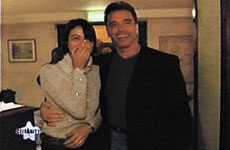|

Schwarzenegger’s extraordinary rise to international
stardom can be traced back to the release of the 1977 documentary
Pumping Iron, directed by George Butler and Robert Fiore.
The film, an extension of the book of the same title, about the
world of bodybuilding competitions, portrays Schwarzenegger in a
fascinating light; the practically Machiavellian way he psychs out
contest opponent Lou Ferrigno (the muscleman who later went on to
portray the Incredible Hulk on television) is something to behold.
(As is a prior film of Schwarzenegger’s, 1970’s Hercules in New
York, a no-budget Z-picture that paired the muscleman, appearing
in the title role under the stage name Arnold Strong, with archetypal
nebbish Arnold Stang.)
It wasn’t until 1982’s Conan the Barbarian that Arnold
demonstrated his box office drawing power. Conan producer
Edward R. Pressman says, “We signed Arnold to a three-picture deal,
which called for him to be paid $250,000 for the first film and
the same for each sequel. The movie turned into a monster hit, and
we sold our sequel rights. I’m sure Arnold was able to renegotiate
his salary for the sequels.” Within just a few short years, he was
on his way to becoming one of the highest-paid movie stars in history.
Because he has achieved such an enormous level of respectability
and credibility, it’s easy to forget that early in his Hollywood
career, he was seen by many as a walking cartoon, if not an out-and-out
joke. (He might have experienced an unpleasant frisson while costarring
in a 1980 TV-movie biopic of Jayne Mansfield, playing Mickey Hartigay,
Mansfield’s bodybuilder-turned-actor husband, who spent the latter
portion of his acting career in such ultra-shlocky Italian horror
pics as The Bloody Pit of Horror.) As do most megastars,
Schwarzenegger has a retinue of agents, managers, advisors, and
hangers-on (to whom he has often demonstrated great loyalty; his
former agent Lou Pitt recalls that über-agent Mike Ovitz “tried
to steal my client Arnold from me any number of times—he was all
over Arnold like a cheap suit!” but that Arnold brushed Ovitz aside,
staying with Pitt for almost 15 years). Still, he has largely made
his own decisions. He has always done it, as the song says, his
way. Which is entirely in keeping with his self-image.
 “I
was born to be a leader. I love being a leader,” he told Britain’s
Loaded magazine two years ago. He’s not the only person impressed
with his alpha-male mien. “He has a completely single-minded style.
It is his agenda or no agenda,” says a longtime associate of Schwarzenegger’s.
A producer who worked with Arnold on True Lies says, “Arnold
is incredible. At one of the marketing meetings, Arnold got up and
spoke and not only knew the direction we should take in marketing
the film, but was so full of confidence, he inspired everyone in
the room.” But confidence can cut a lot of different ways, and Schwarzenegger’s
can manifest itself cruelly. During the filming of Terminator
2, Schwarzenegger had a dresser who, it was generally conceded,
had not been hired for his looks. Often, in front of the whole crew,
Arnold would order the man, “Sit, you ugly dog,” and the man would
drop to his knees like a trained dog. Crew members would laugh,
perhaps nervously, but no one spoke up in protest. The man was finally
put out of his misery when a producer witnessed the spectacle—and
fired the man rather than allow him to continue to be abused by
Schwarzenegger. “I
was born to be a leader. I love being a leader,” he told Britain’s
Loaded magazine two years ago. He’s not the only person impressed
with his alpha-male mien. “He has a completely single-minded style.
It is his agenda or no agenda,” says a longtime associate of Schwarzenegger’s.
A producer who worked with Arnold on True Lies says, “Arnold
is incredible. At one of the marketing meetings, Arnold got up and
spoke and not only knew the direction we should take in marketing
the film, but was so full of confidence, he inspired everyone in
the room.” But confidence can cut a lot of different ways, and Schwarzenegger’s
can manifest itself cruelly. During the filming of Terminator
2, Schwarzenegger had a dresser who, it was generally conceded,
had not been hired for his looks. Often, in front of the whole crew,
Arnold would order the man, “Sit, you ugly dog,” and the man would
drop to his knees like a trained dog. Crew members would laugh,
perhaps nervously, but no one spoke up in protest. The man was finally
put out of his misery when a producer witnessed the spectacle—and
fired the man rather than allow him to continue to be abused by
Schwarzenegger.
“I love the fact that millions of people look up to me,”
Schwarzenegger told Loaded. One reason people continue to
look up to him is because he—and the people around him—have been
so successful at hiding the real Arnold from the world. The star
cleaned house several years ago, not only letting go of Lou Pitt
but also longtime publicist Charlotte Parker, who, for years, had
reputedly been a veritable bull when it came to protecting her client.
In 1990, Team Schwarzenegger attempted to derail the publication
of an unauthorized biography of Schwarzenegger by Wendy Leigh. At
the time, Leigh was engaged in a lawsuit with Schwarzenegger over
her contribution to a piece about the star in Britain’s News
of the World; she was offered a settlement on the condition
that, among other things, she not publish the book. She didn’t accept
that condition; the suit was settled some time later. Charles Fleming
reported in Spy magazine that before Leigh’s book was published,
Franco Columbu, a longtime bodybuilding associate of Schwarzenegger’s,
offered Leigh’s publisher, Contemporary Books, the choice of either
a large amount of money or an “authorized” bio, written with Arnold,
if it would agree to cancel Leigh’s book. Contemporary Books refused.
Once Arnold: An Unauthorized Biography was published, Parker
went into overdrive to bury it. Fleming wrote, “When Time
did a cover story on Arnold and was granted an interview, Parker
explained that the interview would be ended instantly if the reporters
introduced the subject of Leigh’s book.”
A source close to Parker says, “When Charlotte couldn’t kill a
story about one of Arnold’s infidelities, he canned her.” Parker
had done her best. The story was originally slated to be a feature
on a television entertainment-news show; it wound up as a small
gossip-column item that didn’t make many waves. (When Parker, who
no longer does publicity for the star or the Arnold Classic, a Schwarzenegger-affiliated
bodybuilding competition, was first approached about this story,
she said that she would answer specific questions; later, she politely
demurred: “I prefer to not participate in your story.” Schwarzenegger,
too, declined repeated requests to be interviewed for this article.)
Schwarzenegger and his people have also been able to use the ever-intertwining
tendrils of media conglomeration to their benefit. A onetime reporter
for the now-defunct tabloid TV show Hard Copy recalls, “I
had been working on a story about Arnold’s use of steroids. Hard
Copy was owned by Paramount. I was told, in no uncertain terms,
to forget the story. Paramount was afraid that if we did the story,
they would never get Arnold to do a film.”
|
|

